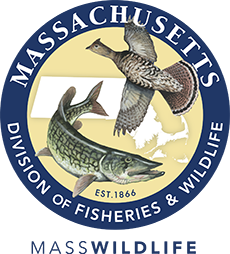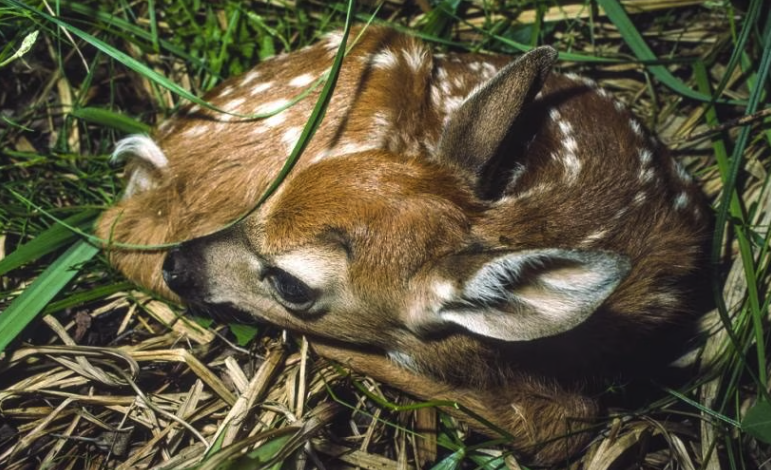I subscribe to the Mass Wildlife Newsletter. There is a lot of information for fishermen and hunters as well as for ordinary citizens. Every now and then the newsletter mentions things that I think are valuable information for residents in Bedford. Two that caught my eye in last week’s newsletter that we deal with in Bedford all the time are baby animals and aggressive turkeys.
First up – Baby Animals: Spring is here and babies abound. Occasionally you may come across one. If you do, what should you do?
Baby birds, baby bunnies, and deer fawns are often seen apparently abandoned in the springtime. Well-intentioned animal lovers often feel compelled to do something to “help.” I know the instinct. When I was a kid, my mother brought home some orphaned baby woodchucks. Often, though, this does more harm than good. The Massachusetts Division of Fisheries and Wildlife (MassWildlife) reminds the public that young wildlife belong in the wild and urges residents to leave young wildlife alone. Often animals that seem abandoned are not. The parents are often nearby and only occasionally visit them to keep them safe from predators.
(Curious reader would like to know, what happened with those woodchucks!) The woodchucks were weaned and eventually were surrendered to Drumlin Farm in Lincoln.
Here’s what Mass Wildlife says you should do in specific situations:
What you should do:
- If you find a baby bird: While baby birds may look helpless, they do not need your assistance unless you see clear signs of injury, such as a broken wing. If you find a hatchling or nestling (a young bird without feathers) outside the nest, you can try to return it to its nest or create an artificial nest. The parents will not reject it if you touch it. If you find a fledgling (a young, fully feathered bird) outside the nest, leave it alone. While it is spending some time hopping around on the ground learning how to fly, the parents are usually nearby still taking care of it. If you find a fledgling near a road or exposed to danger, it can be moved to a safer, sheltered location nearby. Young birds naturally have a low survival rate, which keeps populations in balance with available resources.
- If you find a fawn: Young deer are born in late May and early June. Even if you see a fawn alone for several days, you should still leave it alone. The animal may be motionless and seem vulnerable, but this is the normal behavior for a fawn and the mother (doe) is probably feeding or bedded nearby. Fawns are safest when left alone because their camouflaging color helps them remain undetected. Does visit their fawns to nurse very infrequently, a behavior that helps fawns avoid detection by predators. If sympathetic people repeatedly visit a fawn, it can prolong separation from the doe and delay needed feeding. Fawns cannot be cared for by wildlife rehabilitators; if a fawn is visibly injured or found with its dead mother, call MassWildlife at 508-389-6300. Click here for more information on finding a fawn.
- If you find bunnies or other young mammals: Generally, young mammals are visited by their mother only a few times a day to avoid attracting predators to the young. For example, a nest of bunnies will only be visited by the adult female twice per day to nurse the young. The young are generally safe when left alone because their color patterns and lack of scent help them remain undetected. In most cases, it’s best to leave young animals alone.
- Keep pets leashed. Keeping pets indoors or restrained helps wildlife, as pets often like to chase and hunt songbirds and other mammals. This also helps your pets avoid health and safety dangers posed by wild animals, other pets, or automobiles.
- Contact a wildlife rehabilitator for advice. In almost all cases, it’s best to leave wildlife alone and let nature take its course. In the rare case you find a young animal with a dead parent or if you see visible signs of injury, you can contact a licensed wildlife rehabilitator for assistance. An injured wild animal may be assisted, but a person must deliver the animal immediately to a licensed rehabilitator. MassWildlife licenses wildlife rehabilitators who are qualified to care for most injured or truly orphaned wildlife.
For more information on what to do if you find sick, injured, or young wildlife, please click here.
Spring tips for aggressive turkeys (from Mass Wildlife)
March through May is breeding season for wild turkeys, resulting in increased turkey activity across Massachusetts. Avoid feeding turkeys to prevent conflicts.

Some turkeys may be seen acting aggressively by pecking, following, or exhibiting other intimidating behavior towards people. Males will puff out their feathers, fan their tails, and “strut their stuff” while gobbling and making other vocalizations. This behavior is common during the breeding season and other times of year when turkeys are establishing social dominance or status within the flock.
Wild turkeys live in flocks organized by pecking order. Each bird is dominant over or “pecks on” birds of lesser social status. Turkeys may attempt to dominate or attack people that they view as subordinates, and this behavior is observed most often during breeding season. They may also respond aggressively and peck shiny objects such as windows or automobiles, interpreting their own reflection as an intruding turkey.
Most importantly, MassWildlife urges the public to avoid feeding wild turkeys. Aggressive behavior towards people occurs when turkeys have become overly comfortable in the presence of humans, usually over several months or even years in areas where turkeys are fed. Never intentionally leave out food such as bird seed or corn in attempts to help or view turkeys. Avoid using bird feeders, as fallen bird seed attracts turkeys and other wild animals. For those who enjoy viewing songbirds, MassWildlife recommends planting native plants and shrubs or adding a water feature to attract birds.
“The best thing you can do to prevent conflicts with turkeys is to stop feeding them,” says Dave Scarpitti, MassWildlife Turkey Biologist. “Feeding turkeys, whether intentional or not, can cause turkeys to act tame and may lead to bold or aggressive behavior, especially in the breeding season from March through May. Once this behavior is established, it can be very difficult to change.” People are encouraged to scare or threaten bold turkeys with loud noises or water sprayed from a hose. A leashed dog may also be an effective deterrent. Mylar tape, balloons, or pinwheels can be used in and around your property as a deterrent to turkeys; however all these techniques may have variable success for turkeys that have become highly habituated around people.
For more information on how to prevent problems with aggressive turkeys, check out MassWildlife’s Tips for Wild Turkey.































